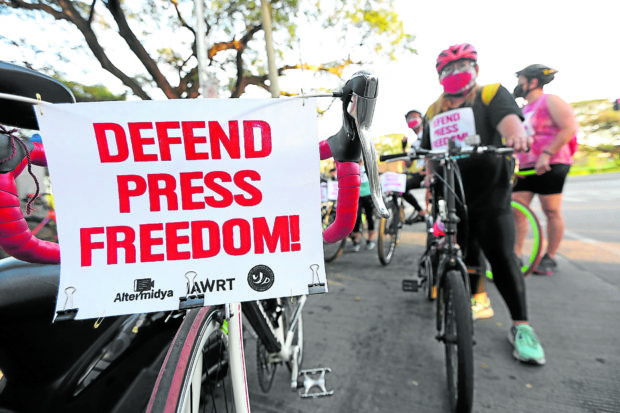Global watchdog lists Duterte among 37 ‘press freedom predators’
For waging a “total war against independent media,” President Duterte has been named a “press freedom predator” by a global media watchdog keeping tabs on world leaders whose policies and governance are seen to pose grave threats to a free press.
On Monday, the Paris-based Reporters Without Borders (RSF) named Mr. Duterte among 37 world leaders who have “trampled on press freedom by creating a censorship apparatus, jailing journalists arbitrarily or inciting violence against them, … [or] directly or indirectly push[ing] for journalists to be murdered.”
It’s the first time Mr. Duterte appears on RSF’s list that was created in 2016.
The list is dominated by the likes of Saudi Arabia’s Mohammed bin Salman, alleged mastermind of the gruesome murder of The Washington Post columnist Jamal Khashoggi, and dictators Kim Jong Un (North Korea), Vladimir Putin (Russia) and Bashar Assad (Syria).
The others listed are heads of ostensible democracies who wield draconian policies to crack down on the press, like Carrie Lam (Hong Kong), Jair Bolsonaro (Brazil), Viktor Orban (Hungary) and Sheikh Hasina (Bangladesh).
“Each of these predators has their own style. Some impose a reign of terror by issuing irrational and paranoid orders. Others adopt a carefully constructed strategy based on draconian laws,” said RSF secretary general Christophe Deloire.
“A major challenge now is for these predators to pay the highest possible price for their oppressive behavior. We must not let their methods become the new normal,” Deloire said. But presidential spokesperson Harry Roque branded the tag on Mr. Duterte as “absolutely bereft of merit.”
Roque also pointed out that Mr. Duterte had not jailed or filed a libel case against any journalist.
Executive power
According to RSF, Mr. Duterte wields his executive power to bend the Philippine legal and justice system. “Judges who don’t toe the line are pushed aside.
Congress tamely endorses all the President’s decisions. Backed by most of the private sector, Duterte easily imposes his line on media outlets owned by businessmen that support him,” RSF said.
It said that with the government “colluding… at all levels” to accommodate him, Mr. Duterte has “an arsenal that he can use to wage ‘total war’ against journalists.”
This includes, among others, “spurious charges of defamation, tax evasion or violation of capital legislation; rescinding broadcast licenses; and using an army of trolls to subject journalists to online harassment,” it said.
RSF said Mr. Duterte’s favorite targets were often “the last sources of resistance” in the mainstream media: the Philippine Daily Inquirer, the broadcast network ABS-CBN, and the online news outfit Rappler.
He has repeatedly made threats against these news outlets and attacked their owners, RSF said. It specifically noted his warning during his inauguration in 2016: that reporters were “not exempt from assassination if you’re a son of a bitch.”
The House of Representatives has since rejected ABS-CBN’s application for franchise renewal.
Rappler CEO Maria Ressa is facing multiple lawsuits.
‘Black’ country
Mr. Duterte is one of 13 leaders in the Asia-Pacific on the RSF list. Under RSF’s classification, the Philippines is a “black” country — meaning the press freedom situation here is “very bad.”
But Roque called attention to news reports on the extrajudicial killings under Mr. Duterte’s war on drugs, which were cited by Fatou Bensouda, the former chief prosecutor of the International Criminal Court (ICC), when she sought a formal investigation of the President.
“If you would look at the findings of the ICC prosecutor, all of those she quoted were media critical of the government. So that proves that freedom of the press is alive and well in the Philippines,” Roque said at a press briefing.
He repeated his earlier claim that the closure of ABS-CBN after the denial of its franchise renewal was an act of Congress. The network’s closure, however, came about after Mr. Duterte’s continued attacks on it, including threats to shut it down.
As for Rappler, Roque said the Securities and Exchange Commission officials who found that it had violated constitutional provisions against foreign ownership were not appointees of Mr. Duterte. “That’s part and parcel, of course, of the media group’s advocacy to promote freer press, but there is really no basis [to say] that our President is a media predator,” Roque added. INQ















